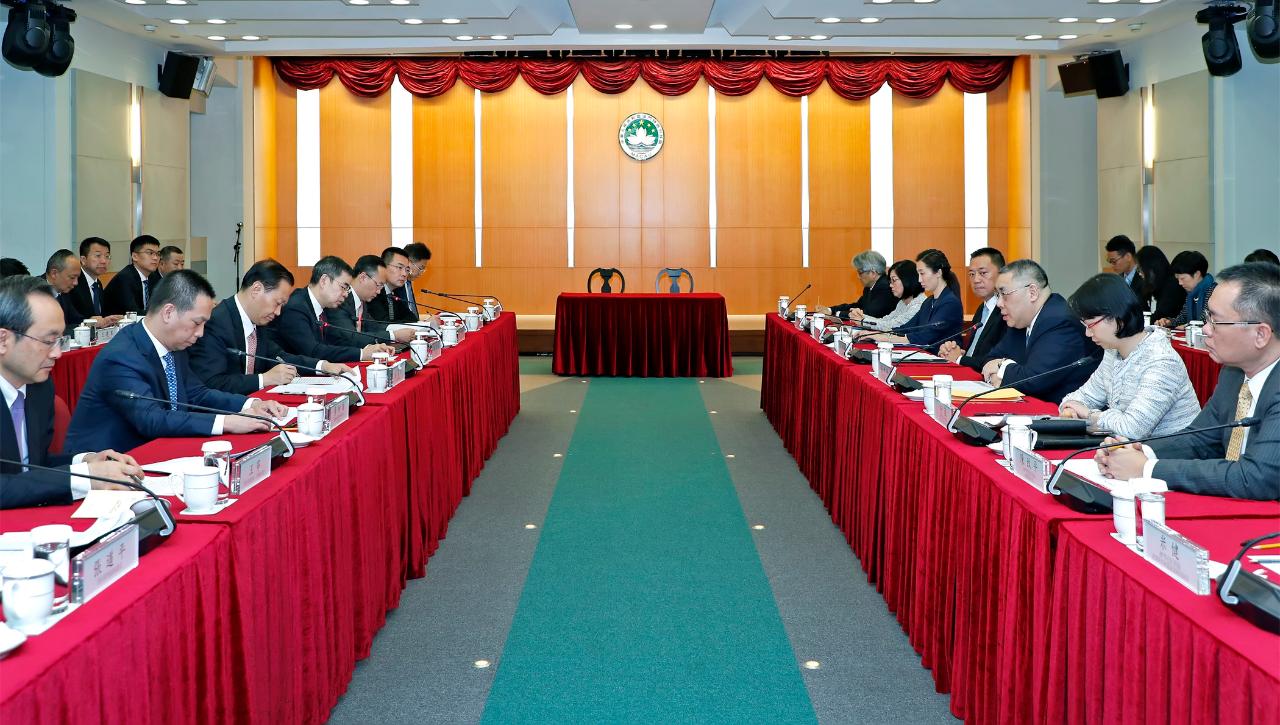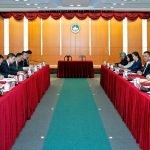 The first Sichuan-Macao Cooperation Conference is held at the Government Headquarters in Macao.
The first Sichuan-Macao Cooperation Conference is held at the Government Headquarters in Macao.
Macao and Sichuan Province agreed today on creation of a mechanism to encourage closer governmental ties and thereby expand existing cooperation and relations.
A formal mechanism for Macao and Sichuan cooperation also facilitates joint contributions to national strategies such as the “Belt and Road” initiative and the Guangdong-Hong Kong-Macao-Greater Bay Area.
The agreement today on establishment of the mechanism occurred via the framework of the Sichuan-Macao Cooperation Conference, and was witnessed by the Chief Executive, Mr Chui Sai On, and the Secretary of the Sichuan Provincial Committee of the Communist Party of China, Mr Peng Qinghua.
The two officials led respective government delegations to attend the first Sichuan-Macao Cooperation Conference, held at the Government Headquarters in Macao.
Following the Conference, the two sides signed a memorandum summarising topics discussed during the meeting, such as directions and areas for future cooperation, and collaboration principles.
The two documents were respectively signed by the Secretary for Economy and Finance, Mr Leong Vai Tac, and Vice Governor of Sichuan, Mr Li Yunze.
With support from the Central Government, the establishment of a mechanism for cooperation aimed to advance Sichuan-Macao ties to a new level, said Mr Chui in his remarks delivered at the meeting.
In furtherance of Macao-Sichuan ties, Mr Chui proposed boosting mutual promotion of the respective local gastronomic and tourist sectors. Macao and Chengdu, in Sichuan, both have been selected as UNESCO Creative Cities of Gastronomy, under the UNESCO Creative Cities Network.
The Chief Executive pointed out Macao’s unique advantages could be helpful in advancing cooperation with Sichuan in education, healthcare, youth affairs, science and technology, and financial services.
Macao and Sichuan had developed long-standing friendly relations, Mr Chui said, via partnership through Pan-Pearl River Delta Regional Cooperation, and via frequent cooperation in matters relating to economic matters and trade fairs, youth exchanges, the Traditional Chinese Medicine sector, tourism, and culture affairs.
In his address, Secretary Peng raised four aspirations regarding the propelling of ties between Macao and Sichuan.
They were to: 1) make better use of the newly-formed Sichuan-Macao mechanism, in order to promote cooperation on a regular basis; 2) contribute jointly to national development strategies and explore opportunities available in markets of member states of the Association of Southeast Asian Nations, and of Portuguese-speaking countries; 3) foster support for Macao businesses cooperating with those Sichuan economic sectors covering trade and commerce; logistics; tourism; meetings, incentives, conferences and exhibitions (MICE) business; financial services; agriculture; and biomedicine; and 4) to strengthen cooperation and exchanges in education; science and technology; urban management; and youth affairs.
Deputy Director of the Hong Kong and Macao Affairs Office of the State Council, Mr Huang Liuquan, and Deputy Director of the Liaison Office of the Central People’s Government in the Macao SAR, Mr Zhang Rongshun, also joined today’s meeting.
Macao officials taking part in the Conference included: the Chief-of-Office of the Chief Executive’s Office, Ms O Lam; the Chief of Office of the Secretary for Economy and Finance, Ms Teng Nga Kan; the Director of the Government Information Bureau, Mr Chan Chi Ping; the Director of the Protocol, Public Relations and External Affairs Office, Ms Lei Ut Mui; and the Director of the Policy Research and Regional Development Bureau of Macao, Mr Mi Jian.
Representing the Sichuan Provincial People’s Government at the Conference were: member of the Standing Committee of the CPC Sichuan Provincial Committee and Managing Vice Governor of Sichuan, Mr Wang Ning; Deputy Secretaries of CPC Sichuan Provincial Committee, Mr Zhang Daoping and Mr Wang Jianjun; and Mr Niu Xiaofeng, Deputy Secretary General of the Sichuan Provincial People’s Government
Prior to the Sichuan-Macao Cooperation Conference, the Chief Executive held a separate meeting with Mr Peng, in order for the officials to exchange views on issues of mutual interest.


